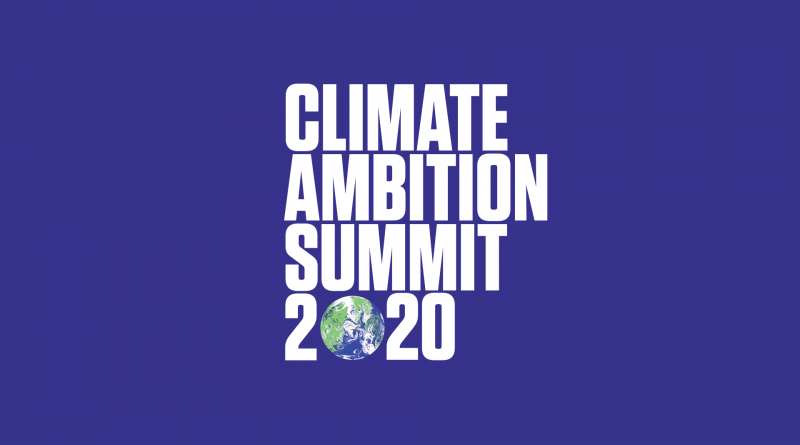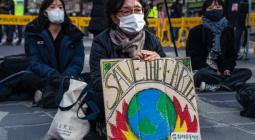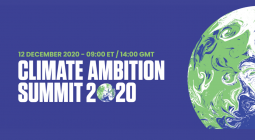Against the odds, 2020 marks breakthrough year for climate action at the outset of the Climate Ambition Summit

Against the odds, 2020 marks breakthrough year for climate action at the outset of the Climate Ambition Summit
- As governments prepare to make commitments at today’s Climate Ambition Summit, new data reveals that members of the UN Race to Zero campaign alone represent 12% of the global economy, giving added hope that private-public momentum will deliver on the promise of Paris.
- 23 regions, 524 cities, 1,397 companies, 569 universities, and 74 investors are now joining the UN Race to Zero campaign. As focus shifts to the robustness of net zero commitments, these actors all meet a stringent criteria, which includes submitting a plan in line with the science and setting interim targets, creating a more consistent and transparent approach towards achieving net zero emissions.
- This growing net zero alliance is spurring countries that have pledged the same ambition -- such as those in the Climate Ambition Alliance -- and which now cover nearly 70% GDP, according to the latest analysis.
- Companies in Race to Zero the campaign have a combined annual revenues of US$9.81 trillion, with new joiners including Arup, BT Pension, GlaxoSmithKline, KPMG International Limited, Primark and Sony.
- In addition, 30 Net Zero Asset Managers, responsible for a combined US$9.1 trillion are joining Race to Zero with the commitment to work with asset owner clients globally on decarbonisation goals, consistent with an ambition to reach net zero emissions by 2050.
- 72 new cities have joined the Race to Zero via Cities Race to Zero, a new collaboration that is mobilising 1,000 cities to join the campaign ahead of COP26.
- The Race to Resilience, the sibling campaign to the Race to Zero, is unveiled. Recognising that emissions reductions must run in parallel with boosting resilience - the Race to Resilience will spur local governments, businesses and investors to respond to the impacts of climate change, from floods to wildfires to pandemics.
To mark the anniversary of the Paris Agreement, the High-Level Climate Champions for the UK and Chile today announce a major update to the Race to Zero campaign, the largest ever alliance of regions, cities, businesses targeting net zero emissions, now numbers over 2,500 members, representing a 30% increase since launching on World Environment Day.
The anniversary brings together over 70 Heads of State at the Climate Ambition Summit, which is being co-hosted by the United Nations, the United Kingdom and France in partnership with Chile and Italy.
During a six-hour event, world leaders from government, business and civil society showcase their commitments to achieving the goals of the Paris Agreement, five years after it was adopted on December 12, 2015.
The Climate Ambition Summit is an opportunity for the world to reflect on the state of climate action and assess if it’s on track to meet the Paris goals. Progress will be captured in the 2020 Yearbook of Global Climate Action, which is being published today, presenting the range and state of action by cities, regions, businesses, investors, and civil society, while also examining the impacts of the COVID-19 pandemic and opportunities for a green resilient recovery. It also provides reflections from the Champions on the future of Marrakech Partnership for Global Climate Action.
In amongst a string of national statements during the summit, the Race to Resilience -- the sibling campaign to Race to Zero -- will also be introduced by Zakiatu Sesay, a member of a frontline community in Freetown: “I’m here to launch the Race to Resilience through which the High-level Champions aim to catalyze action from non-state actors to help make 4 billion people from vulnerable groups and communities, like me, more climate resilient by 2030.”
The campaign will be formally rolled-out at the Climate Adaptation Summit on 25 January, but its headline mission is to catalyse a step-change in climate resilience, reinforcing UN Secretary-General António Guterres’ statement last week that: “the Race to Resilience is as important as the Race to Zero.”
With 100 million more people set to be pushed into extreme poverty by 2030 and millions of people in coastal cities to be driven from their homes by 2050, urgent action is needed to build the resilience of vulnerable communities in the face of climate shocks, which the campaign endeavours to address.
The race to zero is underway, but analyses show the need for greater robustness on the targets made
According to the latest analysis by Oxford-ECIU, net zero commitments globally now cover at least 68% of the global economy (US$84,575 billion), 56% of the global population (over 4.2 billion people), and 61% of global greenhouse gas emissions - an aggregate of more than 28,890 megatonnes of carbon dioxide equivalent.
However, the analysis found that only 18% of net zero targets meet key procedural criteria, including a goal for decarbonization before 2050; a law, policy or strategy that confirms that goal; annual reporting on progress; a published plan for meeting the goal; and interim targets. Such criteria are a core bar for entry for all members of the Race to Zero campaign.
Meanwhile, Data-Driven EnviroLab records that Race to Zero members -- who all meet stringent criteria -- now include:
- City and regional governments representing nearly 8% of the global population. Their baseline emissions cover around 7% of global CO2 emissions.
- Companies representing at least US$ 9.81 trillion in revenue, which is over 12% of the world economy.
Nigel Topping, COP26 High Level Climate Champion, said: “The Race to Zero has set the credible direction of travel for et zero by 2050. Now we are seeing this ambition translating into action, with thousands of companies, cities, states, regions, investors, and universities mobilizing behind this common goal to create a healthy, resilient, zero-carbon economy.”
Mobilizing SMEs to race to zero emissions
In collaboration with Oxford University’s Net Zero Climate Research and Engagement Team, the SME Climate Hub is launching a new tool library to provide small and medium-sized enterprises with freely available resources to reduce carbon emissions, build business resilience and gain a competitive advantage. Since launching in September, the Hub has brought more than 100 small and medium enterprises from 31 countries into the Race to Zero.
Gonzalo Muñoz, COP25 High Level Climate Champion, said: "Small and medium enterprises make up 90% of business and feed the supply chains of major international corporations around the world. SMEs joining the Race to Zero will now help multinationals catalyse net zero targets across their supply chains, making 2021 a year for exponential climate action."
Climate Action Pathway ‘Action Tables’
The Climate Action Pathway ‘Action Tables’, launched on Friday, identify the key change levers and impact areas needed to transform the major sectors of the global economy to be net zero and climate resilient.
The Action Tables build on the Climate Action Pathways released last month, which set out visions for how big and important sectors of the economy can help limit warming to 1.5 degrees Celsius and build resilience by 2050. The Action Tables add granularity to these pathways, giving stakeholders concrete actions that each actor can take over specific time periods, listing initiatives that help them achieve those actions, and nexus with SDGs and other thematic areas on a given set of actions.
UN Climate Change Executive Secretary, Patricia Espinosa, said: “The Climate Action Pathways set out the necessary plans to achieving a resilient, healthy and sustainable future. Our race to zero emissions is a challenge, but these Pathways show that together we can achieve the transformations needed to realize the goals of the Paris Agreement and unleash its full potential.”
In 2021, the Champions intend to build further on the Climate Action Pathways by providing new guidance on how to achieve a just transition for people reliant on old and polluting industry, , gender-responsiveness, resilience and circular economy. Specific topic areas, such as the role of technology to catch and store carbon emissions and a pathway for the finance sector will be developed.
Media contact:
Matthew Phillips: mphillips@unfccc.int / +44 7834 699991
About the UNFCCC/ UN Climate Change
With 197 Parties, the United Nations Framework Convention on Climate Change (UNFCCC) has near universal membership and is the parent treaty of the 2015 Paris Climate Change Agreement. The main aim of the Paris Agreement is to keep a global average temperature rise this century well below 2 degrees Celsius and to drive efforts to limit the temperature increase even further to 1.5 degrees Celsius above pre-industrial levels. The UNFCCC is also the parent treaty of the 1997 Kyoto Protocol. The ultimate objective of all agreements under the UNFCCC is to stabilize greenhouse gas concentrations in the atmosphere at a level that will prevent dangerous human interference with the climate system, in a time frame which allows ecosystems to adapt naturally and enables sustainable development.
See also: http://unfccc.int
About Race to Zero
Race to Zero is the international campaign for a healthy, resilient zero carbon recovery. Led by the UNFCCC Champions for Climate Action, it aims to bring together net zero commitments from cities, businesses and investors across the climate action community in the run up to COP26. Race to Zero collaborates with the following international networks and initiatives, which have independently been mobilizing net zero commitments. All of them have require their participants to meet the Race to Zero’s minimum criteria:
- The Argentinian Network of Municipalities
- B Corporations
- The B Team
- Business Ambition for 1.5 C - Our Only Future
- C40’s Deadline 2020
- Chambers Climate Coalition
- Fashion Charter for Climate Action
- Global Universities and Colleges for the Climate
- ICLEI- Local Governments for Sustainability
- Net-Zero Asset Owners Alliance
- Under2Coalition
- The Climate Pledge
- TED Countdown
Visit the Race to Zero website here.
To see a full list of Race to Zero members, please visit the Global Climate Action Portal.
About Race to Resilience
A global campaign - the sibling to Race to Zero - catalysing a step-change in global ambition for climate resilience, putting people and nature first in pursuit of a resilient world where we don’t just survive climate shocks and stresses but thrive in spite of them. Led by the High-Level Climate Champions for Climate Action – Nigel Topping and Gonzalo Muñoz – Race for Resilience catalyses actors outside of national governments to build the resilience of 4 billion people from vulnerable groups and communities.
About the Net Zero Asset Manager initiative
This is a leading group of global asset managers that commit to support the goal of net zero greenhouse gas emissions by 2050 or sooner, in line with global efforts to limit warming to 1.5°C. They also commit to support investing aligned with net zero emissions by 2050 or sooner. Delivery of the commitment also includes prioritising the achievement of real economy emissions reductions within the sectors and companies in which the asset managers invest. They join the UN Net Zero Asset Owner Alliance, which is committed to creating a healthy, resilient, zero-carbon economy by 2050.





